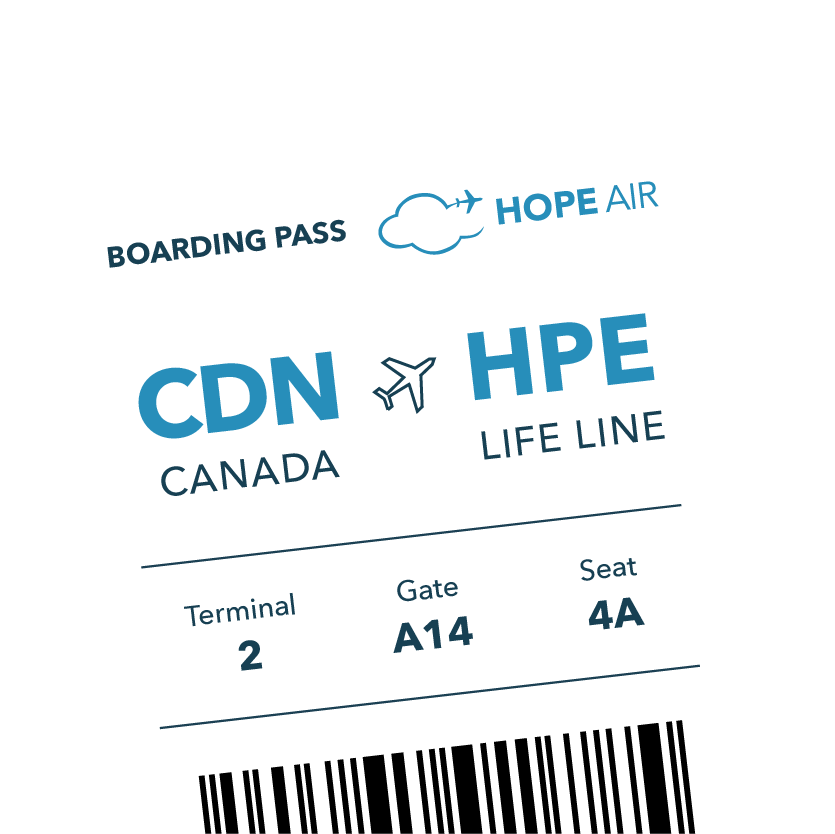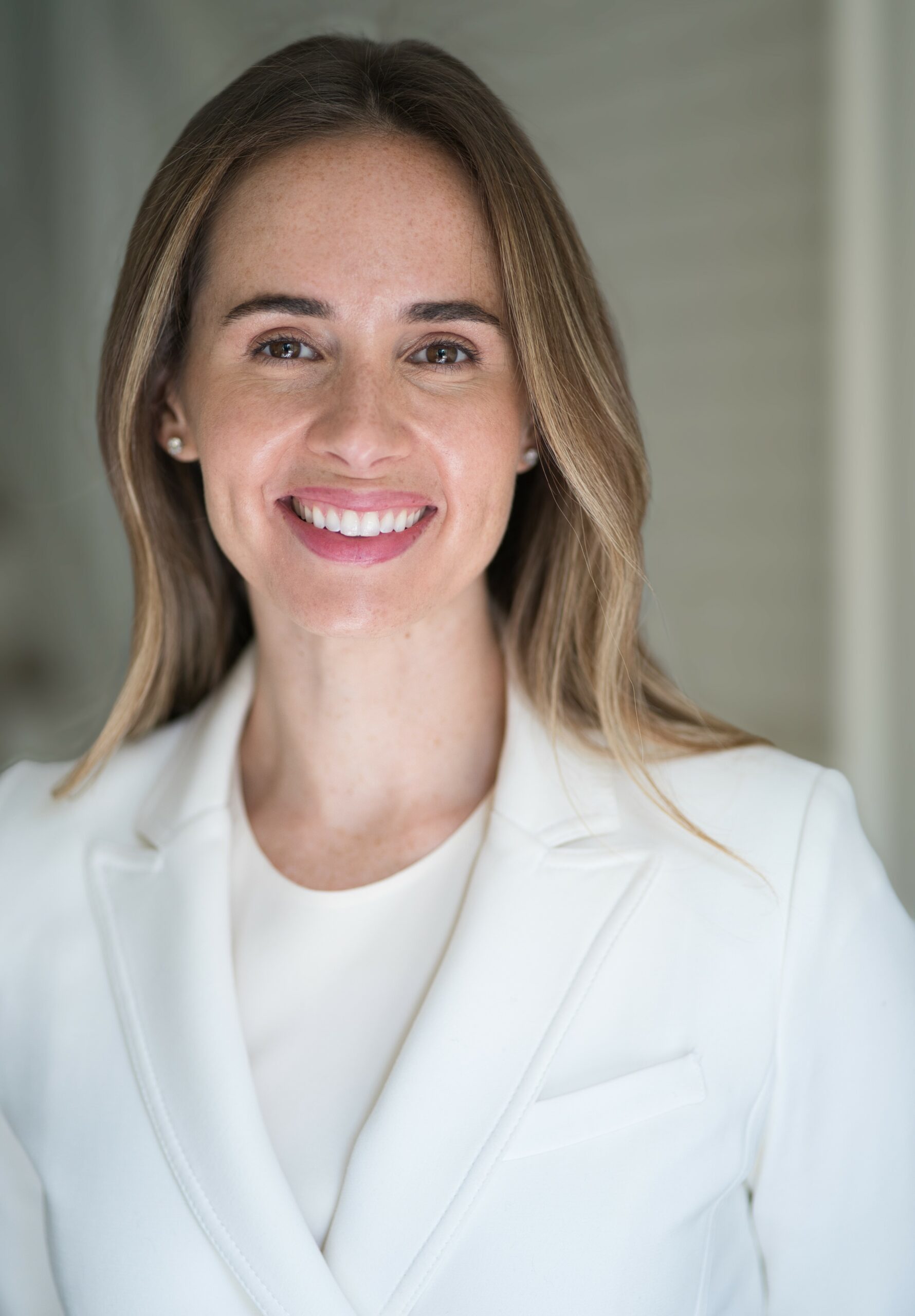A Privilege to Have Access to Care.
An Equal Privilege to Support it.
A Privilege to Have Access to Care. An Equal Privilege to Support it.


Heather Tobin’s connection to Hope Air started as it does for many of the families we serve. Her daughter Vivienne was born with craniosynostosis, a condition where the bones in a baby’s skull fuse together too early and therefore can’t grow to accommodate the child’s developing brain. Heather vividly recalls the shock of learning of this condition after her daughter’s birth, and of the pressure to find the best treatment method in little time.
“It’s something that they couldn’t detect before birth, and your treatment window is incredibly short. We had to decide to proceed with reconstructive surgery of our daughter’s skull within her first four months of life,” she reflects. “We immediately began reaching out to surgeons across North America and everyone told us that Sick Kids (in Toronto, Ontario) was the best craniofacial centre.”
Here is where Heather’s story differs; she and her family were living in Toronto when her daughter was born. There, they were able to easily access care at Sick Kids. While the process of preparing for surgery, the procedure itself, and the follow-up were significant challenges for Vivienne and her family, living in Toronto made this option readily available to them.
“As a parent of a child who needed specialized care, I am so grateful that we were able to easily access treatment when we needed it most in the city where we lived. We were in the fortunate position not to face the same barriers many Canadians have to confront in order to access specialized treatment in major cities across Canada. The financial, emotional, and physical costs of travel to access care are real barriers to making our health care system universally accessible,” she says about her ability to relate to the challenges Hope Air patients face.
Heather realized that the accessibility she and her family experienced wasn’t the case for everyone across the country and she wanted to do something about it. Because many of Hope Air patients are children, the organization matched up with her desire to help young people facing health challenges. “I was totally inspired by the mission and mandate of Hope Air; it aligned fully with my values and I feel fortunate that I’m able to contribute to help others have that same opportunity and access to care that my daughter had.” A family friend, Jim Burton, was Chair of the Hope Air Board of Directors at the time. Heather reached out to learn more and quickly became involved.
“I’ve been involved with Hope Air since 2015 and have been incredibly impressed with the organization. I’m so proud to be a part of a dedicated, passionate, and efficient organization that knows exactly what is needed to support individuals and families who have to travel at such a difficult time. Most importantly, as a donor, I understand the value of my donation in helping Hope Air patients. Through the organization’s transparent disclosure and reporting, I understand and see the tangible impact of my gift.”
It’s that tangible impact that has Heather feeling so invested in Hope Air. “What I value most at Hope Air is that I know my donation is making an impact every day across Canada. When choosing where to put your charitable dollars, there are many worthy causes. At Hope Air, I know exactly how my donation is helping and I feel personally connected to the team, the mission, and most importantly to the people my gift supports. If I can give every year and know that a number of individuals and families are going to benefit from it, that feels great. At Hope Air, every donation can be life-changing for our patients.”
“It’s something that they couldn’t detect before birth, and your treatment window is incredibly short. We had to decide to proceed with reconstructive surgery of our daughter’s skull within her first four months of life,” she reflects. “We immediately began reaching out to surgeons across North America and everyone told us that Sick Kids (in Toronto, Ontario) was the best craniofacial centre.”
Here is where Heather’s story differs; she and her family were living in Toronto when her daughter was born. There, they were able to easily access care at Sick Kids. While the process of preparing for surgery, the procedure itself, and the follow-up were significant challenges for Vivienne and her family, living in Toronto made this option readily available to them.
“As a parent of a child who needed specialized care, I am so grateful that we were able to easily access treatment when we needed it most in the city where we lived. We were in the fortunate position not to face the same barriers many Canadians have to confront in order to access specialized treatment in major cities across Canada. The financial, emotional, and physical costs of travel to access care are real barriers to making our health care system universally accessible,” she says about her ability to relate to the challenges Hope Air patients face.
Heather realized that the accessibility she and her family experienced wasn’t the case for everyone across the country and she wanted to do something about it. Because many of Hope Air patients are children, the organization matched up with her desire to help young people facing health challenges. “I was totally inspired by the mission and mandate of Hope Air; it aligned fully with my values and I feel fortunate that I’m able to contribute to help others have that same opportunity and access to care that my daughter had.” A family friend, Jim Burton, was Chair of the Hope Air Board of Directors at the time. Heather reached out to learn more and quickly became involved.
“I’ve been involved with Hope Air since 2015 and have been incredibly impressed with the organization. I’m so proud to be a part of a dedicated, passionate, and efficient organization that knows exactly what is needed to support individuals and families who have to travel at such a difficult time. Most importantly, as a donor, I understand the value of my donation in helping Hope Air patients. Through the organization’s transparent disclosure and reporting, I understand and see the tangible impact of my gift.”
It’s that tangible impact that has Heather feeling so invested in Hope Air. “What I value most at Hope Air is that I know my donation is making an impact every day across Canada. When choosing where to put your charitable dollars, there are many worthy causes. At Hope Air, I know exactly how my donation is helping and I feel personally connected to the team, the mission, and most importantly to the people my gift supports. If I can give every year and know that a number of individuals and families are going to benefit from it, that feels great. At Hope Air, every donation can be life-changing for our patients.”
Roger and his wife Susie are from Northern Ontario, a nearly thirteen-hour drive from the hospital Roger would have to reach for his compartment syndrome surgery in Hamilton, Ontario. Roger lives near Kapuskasing, Ontario, with his wife Susie. His symptoms first began 15 years ago, with intense pressure and pain in his legs and arms that was accompanied by swelling.
After visiting several doctors near his home and in Thunder Bay, Roger was diagnosed with compartment syndrome, a condition where his muscles expanded as if he had done strenuous exercise. Compartment syndrome is a rare condition where, untreated, causes nerve damage, amputation, loss of muscle function, and kidney failure, among other consequences. Doctors did not know what caused Roger’s condition, but knew that it needed urgent medical intervention.
After visiting several doctors near his home and in Thunder Bay, Roger was diagnosed with compartment syndrome, a condition where his muscles expanded as if he had done strenuous exercise. Compartment syndrome is a rare condition where, untreated, causes nerve damage, amputation, loss of muscle function, and kidney failure, among other consequences. Doctors did not know what caused Roger’s condition, but knew that it needed urgent medical intervention.
We acknowledge that we live and work on the unceded, traditional territories of many Indigenous peoples. We are grateful for the privilege of being on lands that these peoples have nurtured since time immemorial.
Renouvellement annuel du pilote VPP de Hope Air 2022
Exigences de mise à jour des connaissances:
- Au moins 50 heures en tant que commandant de bord sur un avion et 30 heures comme CdB
au cours des 12 derniers mois. - Au moins un vol transnational dans les 90 derniers jours
- Au moins 3 heures comme CdB sur type dans les 90 derniers
jours - Doit satisfaire aux exigences de mise à jour des connaissances des pilotes de Transports Canada: https://tc.canada.ca/fr/aviation/delivrance-licences-pilotes-personnel/garder-ses-connaissances-competences-pilote-jour
Veuillez noter que tous les pilotes bénévoles doivent être entièrement vaccinés contre la COVID-19.
Pour toute question ou préoccupation, veuillez contacter Andrew Knight à aknight@hopeair.ca
Coordonnées
Formulaire pour exprimer l’intérêt de devenir pilote bénévole
Volunteer with Hope Air
Formulaire de contact Devenez un ambassadeur de Vols d’espoir
Formulaire de contact Offrez vos talents
Formulaire de contact pour devenir bénévole au bureau (virtuel)
Bénévole au service à la clientèle
Volunteer with Hope Air
Become A Hope Air Ambassador Contact Form
Volunteer Your Talents Contact Form
Volunteer In (Virtual) Office Contact Form
Volunteer With Client Care
2022 Hope Air VPP Pilot Annual Renewal
Recency Requirements:
- At least 50 hours PIC on aircraft and 30 hours PIC in the past 12 months
- At least one cross-country flight in the last 90 days
- At least three hours PIC on type in the last 90 days
- Must satisfy the Transport Canada Pilot Recency Requirements: https://tc.canada.ca/en/aviation/licensing-pilots-personnel/staying-current-proficient-pilot
Please note, all volunteer pilots must be fully vaccinated for COVID-19.
For questions or concerns, please contact Andrew Knight at aknight@hopeair.ca
Contact Information
Volunteer Pilot Expression of Interest Form